U.S Secretary of State John Kerry meets Belgian Prime Minister Charles Michel in Brussels, Belgium, March 25, 2016.
Last updated on: March 25, 2016 5:00 AM
U.S. Secretary of State John Kerry is meeting with European leaders
in Brussels as a U.S. news report says two Americans were among the
victims of Tuesday's terror attacks there.
U.S.-based NBC News reported Friday that two Americans have been confirmed killed in Tuesday's attacks that left more than 30 people dead. An unnamed U.S. official said no names are available yet as officials are still working to notify the families.
Kerry is in Brussels to offer condolences and offer U.S. help on the investigation to find those responsible for the suicide bombings at Brussels airport and at a metro station. Kerry planned to meet with Belgian Prime Minister Charles Michel and Foreign Minister Didier Reynders.
He also planned to meet with European Commission President Jean-Claude Juncker, and will lay a wreath at the airport in tribute to the victims.
U.S. officials have told reporters that the brothers who carried out Tuesday's attacks, Ibrahim and Khalid El Bakraoui, were on the terrorism watch list in the United States.
Belgian federal prosecutors say six people have been detained for possible links to the attacks. The prosecutors said the raids that led to the arrests took place in central Brussels, Jette and Schaerbeek, the neighborhood where police found a stash of explosives earlier this week in an apartment used by the bombers.
French Interior Minister Bernard Cazeneuve also said a French national was arrested Thursday and found to be in an "advanced stage" of planning a terror attack. Cazeneuve said the man was arrested early Thursday, and said police went back to search his home later that day. French officials said later that he has connections to the suspected ringleader of the Paris attacks of November 13.
EU to step up efforts
Meeting Thursday in the shadow of the Brussels terrorist attacks, European Union justice and interior ministers vowed to deepen joint intelligence gathering and swiftly push through measures to share airline passenger information and step up the fight against terrorism.
"We don’t need new plans, we need to fully implement the plans and measures that have been taken," said Interior Minister Ronald Plasterk of the Netherlands, which currently holds the European Union’s rotating presidency.
Coming two days after the Brussels bombings that killed more than 30 people and wounded more than 260 others, the emergency meeting offered a stark counterpart to the EU’s usually staid gatherings – especially since it took place near the Maalbeek metro station, one of the attacks' targets.
"Everybody feels the attack on Belgium was an attack on Europe and the values we stand for together," Plasterk said. "Europe has been under attack before. But we’ve always defended liberty and democracy and we will do that together."
The meeting comes as Belgian authorities face growing criticism over security lapses, with more evidence of significant links between the Paris attacks in November and Tuesday’s strikes in Brussels.
Security measures criticized
But Belgium is not the only country to face criticism.
"There is a lack of trust. Otherwise, things might have been predicted and then prevented,” said European Home Affairs Commissioner Dimitris Avramopoulos.
Of the Brussels attackers, he added: "They were home-grown, but they were also quite well known to intelligence services. If we were sharing information, we might dissuade their actions. The same for the perpetrators of the attacks in Paris."
The Islamic State (IS) group, which has claimed responsibility for both attacks, released a video Thursday describing the Brussels strikes as a victory and urging its followers to wage jihad.
Critics are particularly questioning how the Brussels suicide bombers could have planned and carried out the attacks under the noses of Belgian authorities, since many had dubious backgrounds and links to the Paris attacks.
Criminal records
The El Bakraoui brothers, two of the three suicide bombers on Tuesday, had criminal records but no known jihadist ties.
Turkish authorities said Ibrahim El Bakraoui was caught near the Syrian border in 2013 and extradited. Belgian’s federal prosecutor’s office said European and international arrest warrants had been issued for Khaled El Bakraoui in connection with the Paris attacks probe.
Najim Laachraoui, named by local media as the third suicide bomber, was stopped by Hungarian authorities last year driving in a rented car with Paris attacks suspect Salah Abdeslam.
Abdeslam is being held in a maximum scrutiny prison in the Belgian town of Bruges and eventually is expected to be extradited to France. His lawyer said Abdeslam, after initially resisting the move, wants a speedy extradition to "explain himself."
On Thursday, Belgian justice and interior ministers tendered their resignations, which were rejected by Prime Minister Charles Michel.
Speaking to local broadcaster RTBF, Justice Minister Koen Geens acknowledged Belgian authorities could have been faster in following up on information Turkey had shared about Ibrahim El Bakraoui.
"The information was passed on, but we have not been diligent, or probably not diligent enough," Geens said.
Security cooperation increasing
But following the EU meeting, he said things were changing swiftly in terms of sharing information and joint investigations among European countries.
A case in point took place last week, when both French and Belgian police carried out raids of residences linked to where assailants of both the Paris and Brussels attacks are believed to have stayed.
Michael Hayden, former director of the U.S. National Security Agency, told VOA the Brussels attack was "almost inevitable."
"I realize that's a pretty dramatic word," Hayden said. "But if you look at what has happened...the soft targets, the transportation targets, the maximum civilian casualties, [it's] something we could see."
Hayden also said it is "certainly not the last" attack IS will carry out, saying the group has a "network that seems to be active and thriving in the heart of Europe."
The retired four-star general, who also headed up the CIA, said European intelligence and security agencies could do a better job at sharing information.
Counter-terrorism expert Thomas Reynard of the Brussels-based Egmont Institute, believes cooperation between French and Belgian police is often underestimated.
“It’s not like we just started cooperation,” he said. “Obviously cooperation between police, between intelligence services anywhere in the world — including often within one single country — is also difficult.”
“So is this a case of perfect cooperation - definitely not,” he added. “But what’s important is these remain hiccups rather than a major lack of cooperation.”
In Brussels, there is little sign that the public is eager to place blame for the attacks.
Belgians observed another minute of silence earlier Thursday for the victims of the Brussels attacks.
Many also placed wreaths and candles in front of makeshift shrines at the Maalbeek metro station.
Asked whether Belgian authorities could have done more to prevent the attacks, state worker Griet Smaers said she didn’t know.
“That’s a question that will be answered in the next weeks and months,” she added. “Right now, I just want to be here — this place where very weird and tough things happened.”
U.S.-based NBC News reported Friday that two Americans have been confirmed killed in Tuesday's attacks that left more than 30 people dead. An unnamed U.S. official said no names are available yet as officials are still working to notify the families.
Kerry is in Brussels to offer condolences and offer U.S. help on the investigation to find those responsible for the suicide bombings at Brussels airport and at a metro station. Kerry planned to meet with Belgian Prime Minister Charles Michel and Foreign Minister Didier Reynders.
He also planned to meet with European Commission President Jean-Claude Juncker, and will lay a wreath at the airport in tribute to the victims.
U.S.
Secretary of State John Kerry puts his hand out to feel for rain as he
arrives at Brussels Airport in Brussels, Belgium, Friday, March 25,
2016.
Belgian authorities continue to search for clues to how the attacks
happened even amid heightened security and an investigation of the
Brussels-based militants that attacked Paris in November.U.S. officials have told reporters that the brothers who carried out Tuesday's attacks, Ibrahim and Khalid El Bakraoui, were on the terrorism watch list in the United States.
Belgian federal prosecutors say six people have been detained for possible links to the attacks. The prosecutors said the raids that led to the arrests took place in central Brussels, Jette and Schaerbeek, the neighborhood where police found a stash of explosives earlier this week in an apartment used by the bombers.
French Interior Minister Bernard Cazeneuve also said a French national was arrested Thursday and found to be in an "advanced stage" of planning a terror attack. Cazeneuve said the man was arrested early Thursday, and said police went back to search his home later that day. French officials said later that he has connections to the suspected ringleader of the Paris attacks of November 13.
EU to step up efforts
Meeting Thursday in the shadow of the Brussels terrorist attacks, European Union justice and interior ministers vowed to deepen joint intelligence gathering and swiftly push through measures to share airline passenger information and step up the fight against terrorism.
"We don’t need new plans, we need to fully implement the plans and measures that have been taken," said Interior Minister Ronald Plasterk of the Netherlands, which currently holds the European Union’s rotating presidency.
Coming two days after the Brussels bombings that killed more than 30 people and wounded more than 260 others, the emergency meeting offered a stark counterpart to the EU’s usually staid gatherings – especially since it took place near the Maalbeek metro station, one of the attacks' targets.
"Everybody feels the attack on Belgium was an attack on Europe and the values we stand for together," Plasterk said. "Europe has been under attack before. But we’ve always defended liberty and democracy and we will do that together."
The meeting comes as Belgian authorities face growing criticism over security lapses, with more evidence of significant links between the Paris attacks in November and Tuesday’s strikes in Brussels.
Security measures criticized
But Belgium is not the only country to face criticism.
"There is a lack of trust. Otherwise, things might have been predicted and then prevented,” said European Home Affairs Commissioner Dimitris Avramopoulos.
Of the Brussels attackers, he added: "They were home-grown, but they were also quite well known to intelligence services. If we were sharing information, we might dissuade their actions. The same for the perpetrators of the attacks in Paris."
The Islamic State (IS) group, which has claimed responsibility for both attacks, released a video Thursday describing the Brussels strikes as a victory and urging its followers to wage jihad.
Police and other emergency workers stand in front of the damaged Zaventem Airport terminal in Brussels on March 23, 2016.
Critics are particularly questioning how the Brussels suicide bombers could have planned and carried out the attacks under the noses of Belgian authorities, since many had dubious backgrounds and links to the Paris attacks.
Criminal records
The El Bakraoui brothers, two of the three suicide bombers on Tuesday, had criminal records but no known jihadist ties.
Turkish authorities said Ibrahim El Bakraoui was caught near the Syrian border in 2013 and extradited. Belgian’s federal prosecutor’s office said European and international arrest warrants had been issued for Khaled El Bakraoui in connection with the Paris attacks probe.
Najim Laachraoui, named by local media as the third suicide bomber, was stopped by Hungarian authorities last year driving in a rented car with Paris attacks suspect Salah Abdeslam.
Abdeslam is being held in a maximum scrutiny prison in the Belgian town of Bruges and eventually is expected to be extradited to France. His lawyer said Abdeslam, after initially resisting the move, wants a speedy extradition to "explain himself."
On Thursday, Belgian justice and interior ministers tendered their resignations, which were rejected by Prime Minister Charles Michel.
Speaking to local broadcaster RTBF, Justice Minister Koen Geens acknowledged Belgian authorities could have been faster in following up on information Turkey had shared about Ibrahim El Bakraoui.
"The information was passed on, but we have not been diligent, or probably not diligent enough," Geens said.
Security cooperation increasing
But following the EU meeting, he said things were changing swiftly in terms of sharing information and joint investigations among European countries.
A case in point took place last week, when both French and Belgian police carried out raids of residences linked to where assailants of both the Paris and Brussels attacks are believed to have stayed.
Special
operations police secure an area during a police raid in the Molenbeek
neighbourhood of Brussels, Belgium on March 18, 2016.
Attack 'almost inevitable'Michael Hayden, former director of the U.S. National Security Agency, told VOA the Brussels attack was "almost inevitable."
"I realize that's a pretty dramatic word," Hayden said. "But if you look at what has happened...the soft targets, the transportation targets, the maximum civilian casualties, [it's] something we could see."
Hayden also said it is "certainly not the last" attack IS will carry out, saying the group has a "network that seems to be active and thriving in the heart of Europe."
The retired four-star general, who also headed up the CIA, said European intelligence and security agencies could do a better job at sharing information.
Counter-terrorism expert Thomas Reynard of the Brussels-based Egmont Institute, believes cooperation between French and Belgian police is often underestimated.
“It’s not like we just started cooperation,” he said. “Obviously cooperation between police, between intelligence services anywhere in the world — including often within one single country — is also difficult.”
“So is this a case of perfect cooperation - definitely not,” he added. “But what’s important is these remain hiccups rather than a major lack of cooperation.”
Bystanders
look at the flowers and candles set out as a memorial outside the
Moelenbeek metro station in Brussels, March 24, 2016. (L. Bryant/VOA)
Belgians still in mourningIn Brussels, there is little sign that the public is eager to place blame for the attacks.
Belgians observed another minute of silence earlier Thursday for the victims of the Brussels attacks.
Many also placed wreaths and candles in front of makeshift shrines at the Maalbeek metro station.
Asked whether Belgian authorities could have done more to prevent the attacks, state worker Griet Smaers said she didn’t know.
“That’s a question that will be answered in the next weeks and months,” she added. “Right now, I just want to be here — this place where very weird and tough things happened.”
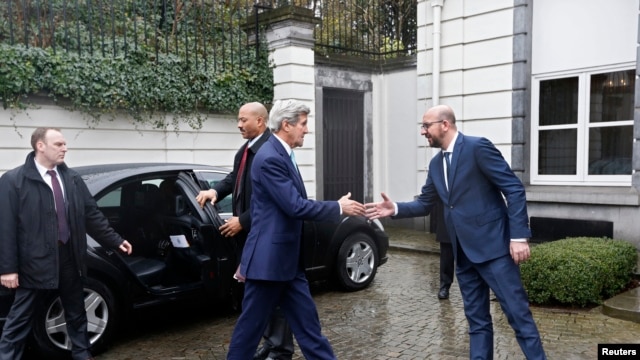
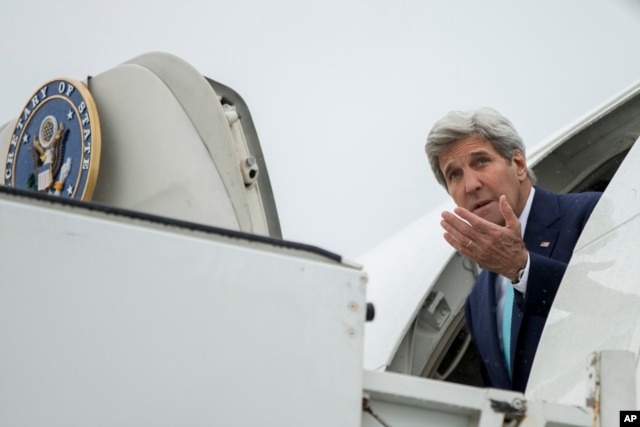
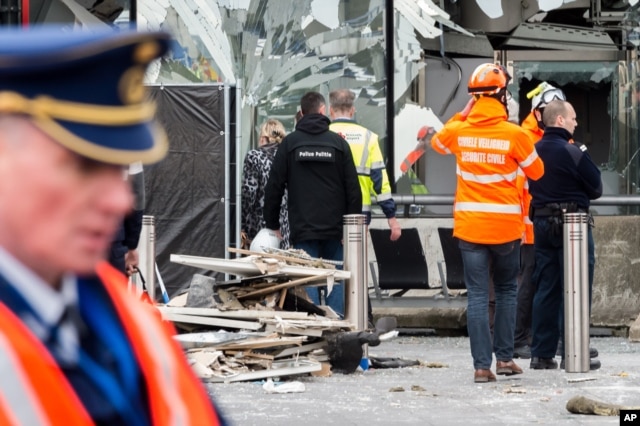
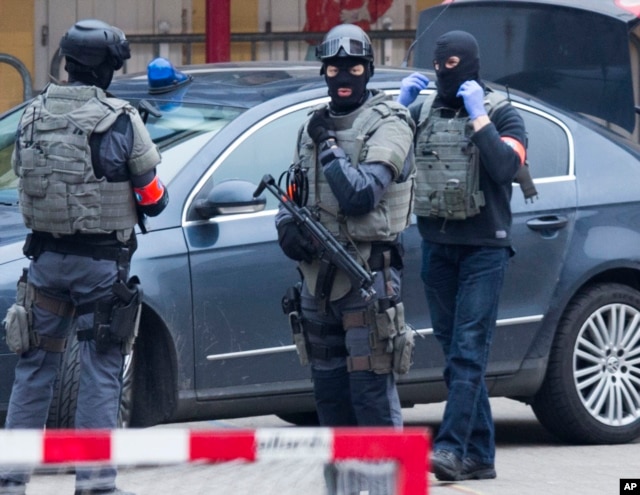
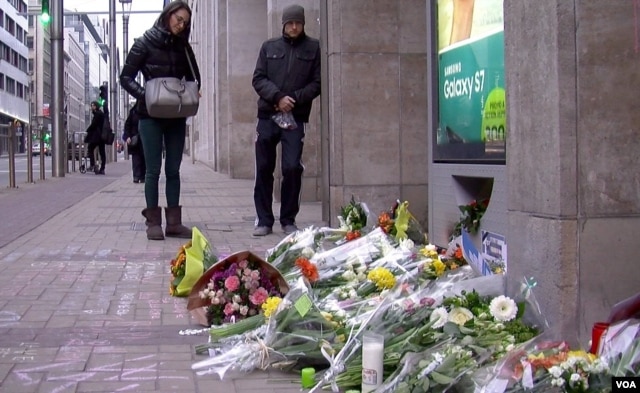
No comments:
Post a Comment